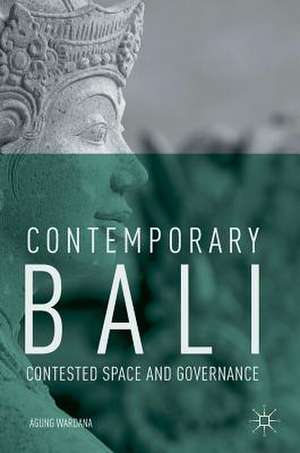Contemporary Bali: Contested Space and Governance
Autor Agung Wardanaen Limba Engleză Hardback – 5 feb 2019
This book offers a comprehensive examination of spatial and environmental governance in contemporary Bali. In the era of decentralisation, Bali's eight district governments and one municipality acquired a strong sense of authority to extract revenues from within their territorial borders while disregarding the impacts beyond them which has exacerbated environmental, cultural and institutional issues. These issues are addressed through reorganising space. In reality, however, such re-organisation has predominantly been in order to provide space for tourism investments and market expansion. The outcomes of reorganising space are in fact shaped by the dynamics of power that interface with increasingly complex legal and institutional structures. These complex structures provide more arenas for vested interests to manoeuvre, but at the same time provide different forms of legitimacy for local forces to challenge the dominant process. The book demonstrates the mechanisms through which social actors mobilise legal-institutional arrangements to advance their interests.
Preț: 531.26 lei
Preț vechi: 625.01 lei
-15% Nou
Puncte Express: 797
Preț estimativ în valută:
101.67€ • 105.50$ • 84.98£
101.67€ • 105.50$ • 84.98£
Carte tipărită la comandă
Livrare economică 17-31 martie
Preluare comenzi: 021 569.72.76
Specificații
ISBN-13: 9789811324772
ISBN-10: 9811324778
Pagini: 317
Ilustrații: XIX, 289 p. 8 illus.
Dimensiuni: 148 x 210 mm
Greutate: 0.52 kg
Ediția:1st ed. 2019
Editura: Springer Nature Singapore
Colecția Palgrave Macmillan
Locul publicării:Singapore, Singapore
ISBN-10: 9811324778
Pagini: 317
Ilustrații: XIX, 289 p. 8 illus.
Dimensiuni: 148 x 210 mm
Greutate: 0.52 kg
Ediția:1st ed. 2019
Editura: Springer Nature Singapore
Colecția Palgrave Macmillan
Locul publicării:Singapore, Singapore
Cuprins
Chapter 1 Introduction.- Chapter 2 The Politics of Development in Bali.- Chapter 3 Crisis and Reorganisation of Space.- Chapter 4 Contesting Sacred Boundaries of Uluwatu.- Chapter 5 The Making of World Heritage Landscape.- Chapter 6 Reclaiming the Common of Benoa Bay.- Chapter 7 Rescaling Space and Resistance.- Chapter 8 Conclusion.
Notă biografică
Agung Wardana is a Lecturer at Faculty of Law, Universitas Gadjah Mada, Indenesia. He holds a PhD from Asia Research Centre, Murdoch University, Australia. His articles have been published by Asia Pacific Journal of Anthropology, Asian Journal of Comparative Law, Asia Pacific Journal of Environmental Law. His research interests include: environmental law and governance, world heritage conservation, legal geography, and socio-legal studies.
Textul de pe ultima copertă
This book offers a comprehensive examination of spatial and environmental governance in contemporary Bali. In the era of decentralisation, Bali's eight district governments and one municipality acquired a strong sense of authority to extract revenues from within their territorial borders while disregarding the impacts beyond them which has exacerbated environmental, cultural and institutional issues. These issues are addressed through reorganising space. In reality, however, such re-organisation has predominantly been in order to provide space for tourism investments and market expansion. The outcomes of reorganising space are in fact shaped by the dynamics of power that interface with increasingly complex legal and institutional structures. These complex structures provide more arenas for vested interests to manoeuvre, but at the same time provide different forms of legitimacy for local forces to challenge the dominant process. The book demonstrates the mechanisms through which socialactors mobilise legal-institutional arrangements to advance their interests.
Caracteristici
An important contribution to legal geography, governance, and the anthropology of law, as well as to the understanding of economic developments in Bali Broadens the definitions of law and space, and applies these within the complex legal-institutional configurations of decentralised Indonesia Demonstrates the mechanisms through which social actors mobilise legal-institutional arrangements to advance their interests Highlights the extent to which multiple and often conflicting spatial constructions, arising from diverse interests and identities at different governance scales, reflect back on the existing political-legal constellation, with significant social, cultural, and ecological implications
